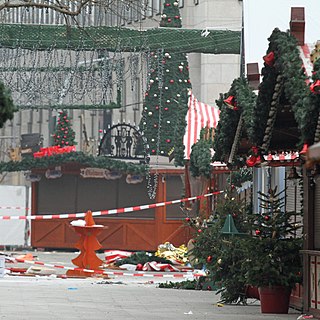
Schleswig-Holstein Police is a state law-enforcement agency in Schleswig-Holstein, Germany. It is subordinated to the Schleswig-Holstein Ministry of the Interior, Municipal Affairs, Housing and Sports.

The Neumünster Flensburg Railway is part of the Jutland line, the main north–south rail link through Schleswig-Holstein, Germany. Together with the line to Husum, which diverges in Jübek, and the line to Kiel, which diverges in Rendsburg, it also serves as an important east–west axis between Kiel and the Marsh Railway on the west coast. It consists of several sections that were parts of the first railways in the current territory of Germany.
The 2016 Munich knife attack took place on 10 May 2016 when a 27-year-old mentally disturbed man stabbed four men, one of them fatally at Grafing station in the Upper Bavarian town of Grafing, some 32 kilometres (20 mi) from Munich, southern Germany. As the knifer reportedly shouted "Allahu Akbar" while stabbing the random victims, first reactions of the German and international media as well as the general public suspected an Islamist attack. On his arrest shortly after the attack, the perpetrator proved to be a mentally disturbed, unemployed carpenter with drug problems and no known ties to Islamist organizations. In August 2017, the Landgericht München II ruled the man to not be criminally liable of the crime and committed him to a closed psychiatric ward.

Simone Lange is a German politician of the Social Democratic Party (SPD) who has served as elected mayor of Flensburg since 2017.

On 18 July 2016, Riaz Khan Ahmadzai, a 17-year-old refugee from Afghanistan, stabbed and injured five people on and outside a train near Würzburg, Germany. He was shot dead by police soon afterwards, after attacking a police tactical unit with an axe. Investigations revealed he was in contact with members of the Islamic State.

The 2016 Hamburg stabbing attack, also referred to as Murder at the Alster or Alster Murder, was an attack on 16 October 2016 in the city of Hamburg, Germany. A 23- to 25-year-old man "of southern appearance" was named as the suspect. On 30 October 2016, the Islamic State (IS) claimed responsibility for the attack, though police later said a terrorist background or motive for the attack was "unlikely".

On 19 December 2016, a truck was deliberately driven into the Christmas market next to the Kaiser Wilhelm Memorial Church at Breitscheidplatz in Berlin, leaving 12 people dead and 56 others injured. One of the victims was the truck's original driver, Łukasz Urban, who was found shot dead in the passenger seat. The truck was eventually stopped by its automatic brakes. The perpetrator was Anis Amri, an unsuccessful asylum seeker from Tunisia. Four days after the attack, he was killed in a shootout with police near Milan in Italy. An initial suspect was arrested and later released due to lack of evidence. Nearly five years after the attack, a man who was critically injured during the attack died from complications related to his wounds, becoming the 13th victim.
The Hanover stabbing that occurred on 26 February 2016 was a terrorist stabbing of a police officer in Hanover, Germany, by a 15-year-old girl born to a Moroccan mother and a German father. She had been raised under the influence of salafist preachings, as early as 7 years. She had been investigated by the Federal Office for the Protection of the Constitution for preparing a serious crime already in 2014 and had traveled to meet ISIS members in Istanbul in November 2015. It was the first reported attack by an ISIS sympathiser in Germany.

The 2017 Hamburg knife attack was a stabbing incident that occurred on 28 July 2017 in Hamburg, Germany. The perpetrator was a 26 year old Palestinian failed asylum seeker who took a 20 cm-long kitchen knife from a supermarket shelf to attack several people, killing one. He was known to have had psychological and drug problems. An Islamist, he was radicalized by ISIS propaganda videos online and had contacts with Salafists, but was not considered to be a jihadist.
The Murder of Mia Valentin was a fatal stabbing on 27 December 2017 in the town of Kandel in Rhineland-Palatinate, Germany. An Afghan asylum seeker, who had been denied refugee status, was charged with the murder of his 15-year-old German former girlfriend, allegedly after she ended the relationship. The case was reported in the national and international press and sparked a political debate about the German refugee policies, especially how to deal with underage unaccompanied refugees.
On 7 March 2018, two stabbings occurred in Vienna, Austria during the evening. A man has been arrested for both attacks. On 11 March 2018, there was a separate stabbing attack at the Embassy of Iran in the city. The Austrian government hardened its asylum policy after the attacks.
On 25 March 2018, a 24-year-old woman, Vivien K was stabbed by a Syrian migrant in Burgwedel, Germany. She received life-threatening injuries and was put into an induced coma. She woke up three days later, with broken ribs and part of her pancreas as well as her spleen removed.
The 2018 Hamburg stabbing attack was an attack on 12 April 2018 in the city of Hamburg, Germany. A man from Niger stabbed his ex-wife and his one-year-old daughter on a station platform. Both victims died. The perpetrator had arrived in 2013 via Lampedusa, seeking asylum in Germany and was granted a residence permit. He lost a custody dispute days before the incident. If he had won, he might have been allowed to stay in Germany.

The 2018 Chemnitz protests took place in Chemnitz, in the German state of Saxony. In the early morning of 26 August, after a festival celebrating the city's founding, a fight broke out resulting in the death of a German man and serious injuries to two other people. Two Kurdish immigrants, one from Iraq and the other from Syria, were named as suspects. The incident reignited the tensions surrounding immigration to Germany, which had been ongoing since 2015, and the European migrant crisis. In response, mass protests against immigration were ignited by far-right groups. The protests spawned riots and were followed by counter-demonstrations.

The 2018 Amsterdam stabbing attack was an attack on 31 August 2018, in Amsterdam Centraal station. A 19-year-old man from Afghanistan stabbed and injured two American tourists. The attacker was shot and injured by the police. Amsterdam Police confirmed that they believe he had a terrorist motive.
The 2020 Dresden knife attack occurred on 4 October 2020, when a man was killed and another injured during a knife attack in Dresden, Germany. After two weeks, the 20-year-old perpetrator was arrested, Abdullah al-H. H., a Syrian national who arrived in Germany in 2015 to seek asylum. He had been sentenced in November 2018 to two years and nine months for supporting a terrorist organization and planning an attack with contacts with a militant in Yemen and working on the construction of suicide belts. He had been released from prison in September 2020. Europol classified the attack as jihadist terrorism.
The 2021 Würzburg stabbing occurred on 25 June 2021 in Würzburg, Germany. Abdirahman Jibril, a 24-year-old homeless man of Somalian nationality killed three civilians with a kitchen knife in a Woolworth store and wounded seven others. Minutes later, the police shot the suspect into his leg and arrested him. He had a history of a several violent altrications since his 2015 arrival as an asylum seeker in Germany and one day involuntary commitment into a psychiatric hospital a month before the attack. Islamist motives were suspected; he himself said the attack was 'his jihad'. Another refugee accused him to be an al-Shabaab member, who had killed civilians, journalist and police officers in Somalia, which German authorities could not confirm.
The Brokstedt stabbing was a mass stabbing on a train in Brokstedt, Schleswig-Holstein, Germany on 25 January 2023. A 33-year-old stateless man from the Palestinian territories stabbed nine people on a moving passenger train, killing two. He came to Germany in 2014 and was granted subsidiary protection in 2016, even though he was known to police for sexual and violent offenses with 24 preliminary and criminal proceedings. He had been in police custody until one week before the attack. The public prosecutor saw the motive for the crime as anger and frustration at his personal situation. In February 2023, "considerable shortcomings in the communication and administration of the authorities involved in immigration" were found.